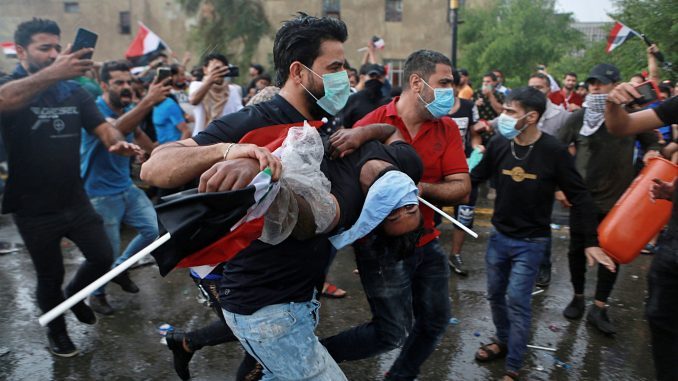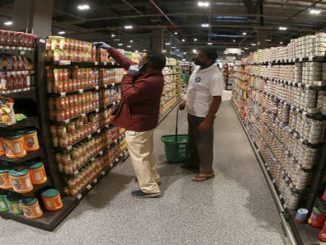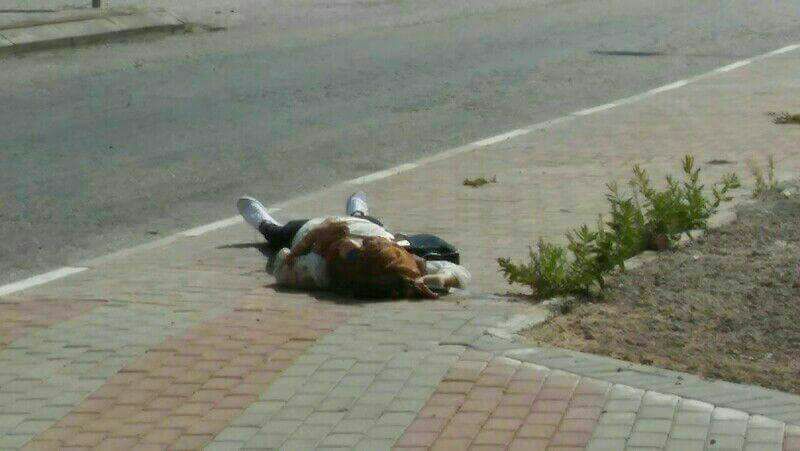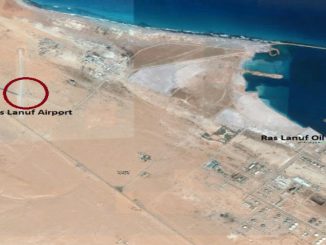
Ten people have been killed in Basra as Iraqi security forces continued their repression of anti-corruption protests, with Iraq’s foremost Shia cleric saying the government must meet protesters’ demands. Police and medical sources say at least 35 people wounded in clashes near capital’s Shuhada Bridge
Iraqi security forces fatally shot at least ten protesters in central Baghdad on Thursday, police and medical sources said, as weeks of deadly unrest showed no signs of abating. At least 35 people were wounded in the clashes near Shuhada Bridge, they said, as mass demonstrations continued for a 13th straight day with thousands thronging central areas of the capital.
In southern Iraq, dozens of anti-government protesters burned tyres and blocked the entrance to the port of Umm Qasr, preventing lorries from transporting vital food imports, just hours after operations had resumed, port officials said.
In the city of Basra, security forces fatally shot at least four protesters as they tried to disperse an anti-government sit-in, Reuters reported.
The Iraqi government has failed to find a way out of the biggest and most complicated challenge to its rule in years.
The unrest has shattered the relative calm that followed the defeat of Islamic State (IS) group in 2017.
A crackdown by authorities against mostly unarmed protesters has killed more than 250 people since unrest broke out on 1 October over lack of jobs, services and an infrastructure wrecked by decades of conflict, sanctions and corruption.
Protesters, mostly unemployed youths, blame a political elite that has ruled Iraq since the toppling of Saddam Hussein in a 2003 US-led invasion, and demand a complete overhaul of the political system.
The country is beginning to feel the fiscal pinch of weeks of the unrest, which started in Baghdad and quickly spread to southern cities.
The new stoppage of operations at Umm Qasr port in the south is likely to compound financial losses a day after the government said that a week-long halt of operations there had cost more than $6bn.
Fuel shortages
Umm Qasr briefly resumed operations early on Thursday after most protesters cleared the area, the Reuters news agency reported.
But several dozen activists, relatives of a demonstrator killed during weeks of violence, then returned to block the main gate, port officials said.
Umm Qasr receives most of the grain, vegetable oils and sugar that Iraq depends upon.
Oil and security officials said operations resumed on Thursday at the nearby Nassiriya oil refinery, where protesters had stopped fuel tankers entering or leaving the day before.
Oil production and exports have not been significantly affected by the unrest, oil ministry officials say.
But the halting of fuel tankers that transport fuel from the Nassiriya refinery to regional gas stations have caused fuel shortages across the southern Iraqi province of Dhi Qar.
The refinery had recently been producing about half its capacity, oil officials said.
The internet returned briefly in most parts of Iraq on Thursday but went out again after 1pm local time (10 GMT).
Authorities have restricted internet access during the protests.
The government says it is enacting reforms but has offered nothing that is likely to satisfy most protesters.
Stipends for the poor, more job opportunities for graduates and pledges to punish a handful of corrupt officials have come too late for those demanding an overhaul of state institutions, a flawed electoral process and a system of governance that has fuelled endemic corruption, many Iraqis say
Sistani supports demonstrations
In a speech read out on his behalf today in the Shia holy city of Najaf, Iraq’s foremost Shia cleric, Grand Ayatollah Ali Sistani, praised protesters while holding Iraqi security forces responsible for their deaths.
He added that the Iraqi government must immediately meet protesters’ demands.
Sistani said that “Iraqi political factions who hold power now have a unique opportunity to meet protesters’ demands according to an agreed roadmap, within a specific period of time”.
However, Sistani also said that there were “internal and foreign” factions trying to influence the protests.
The head of the Iraqi Group for Strategic Studies, Wathiq Al-Hashemi, said that the influential Shia cleric’s remarks could be interpreted as a second chance to Iraq’s embattled Prime Minister, Adel Abdel Mahdi, who has been deserted by allies and faced calls to resign.
He said that Sistani wanted to give a message to Abdel Mahdi that he could stay in office for now as long as he made a serious attempt to carry out reforms.
The unemployment rate is roughly 25 percent among young Iraqis while Iraq is ranked as the 12th most corrupt country in the world by Transparency International.
The Iraqi government has said it will hold some corrupt officials to account, provide stipends to poor families and job opportunities to poor people, but these reforms have been rejected as cosmetic and insincere by protesters.
The protests have been described as the biggest challenge to the Iraqi government since the defeat of IS in Iraq in 2017
Basra itself is located in an oil-rich region of Iraq but suffers from a very high poverty rate of 22.5 percent.
The nearby port of Umm Qasr has been blockaded by Iraqi protesters for a week. The protesters have prevented lorries from transporting food imports and the Iraqi government estimates that disruption to the port’s operation has cost over $6 billion.
In other southern Iraqi cities such as Karbala, Najaf, Diwaniya, Nasiriyah and Amarah, thousands of protesters camped overnight in the main squares. Activists said that security forces have detained many people in Nasiriyah.
Six people were killed in the Iraqi capital Baghdad yesterday by security forces. However, more protesters gathered in the city’s iconic Tahrir Square on Friday morning.



